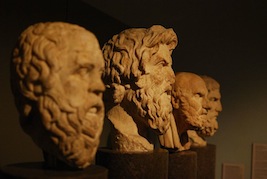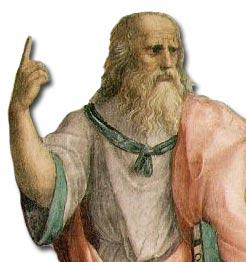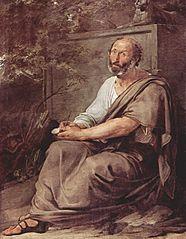The word 'philosophy' stems from the Ancient Greek philosophia, which literally means the "love of wisdom". Philosophy is a study that seeks to answer fundamental problems prevalent within the world pertaining to topics such as ethics, knowledge, existence causality, mind, reason, language, etc. Philosophy is also uniquely distinguished by its method of arriving at conclusions through rational argument and systematic reasoning.
 One of the most famous methods of philosophical inquiry was Socrate's dialectic questioning. In the 5th century BC, Socrates used this approach to examine the moral concepts of goodness and justice. His other important topics include virtue, politics and the nature of knowledge. Since Socrates did not write any philosophical texts, all our knowledge of Socrates' philosophy is given to us through his students Plato, Aristotle, Xenophon and Aristophanes. Although Plato's Socratic dialogues were instrumental in passing on Socrate's philosophies, Plato himself was also a much accomplished philosopher throughout the late 5th century to early 4th century BC. One of Plato's most influential works was The Republic in which was outlined important ideas on justice, virtue, the nature of good and the ideal state. Students may also be familiar with some of his other famous concepts such as the Theory of Forms and the Allegory of the Cave. Plato also founded one of the first academic schools of philosophy, the Academy in Athens, where Aristotle was an avid student. During the 4th century BC, Aristotle wrote on a wide array from subjects from metaphysics to the fine arts to politics to zoology. Plato's thought primarily revolved around deductive reasoning, whereas Aristotle used both to incorporate inductive and deductive reasoning in combination; this began the groundwork for our modern scientific method. Furthermore, within his Metaphysics, Aristotle laid down many crucial ideas pertaining to causality, existence and motion.
One of the most famous methods of philosophical inquiry was Socrate's dialectic questioning. In the 5th century BC, Socrates used this approach to examine the moral concepts of goodness and justice. His other important topics include virtue, politics and the nature of knowledge. Since Socrates did not write any philosophical texts, all our knowledge of Socrates' philosophy is given to us through his students Plato, Aristotle, Xenophon and Aristophanes. Although Plato's Socratic dialogues were instrumental in passing on Socrate's philosophies, Plato himself was also a much accomplished philosopher throughout the late 5th century to early 4th century BC. One of Plato's most influential works was The Republic in which was outlined important ideas on justice, virtue, the nature of good and the ideal state. Students may also be familiar with some of his other famous concepts such as the Theory of Forms and the Allegory of the Cave. Plato also founded one of the first academic schools of philosophy, the Academy in Athens, where Aristotle was an avid student. During the 4th century BC, Aristotle wrote on a wide array from subjects from metaphysics to the fine arts to politics to zoology. Plato's thought primarily revolved around deductive reasoning, whereas Aristotle used both to incorporate inductive and deductive reasoning in combination; this began the groundwork for our modern scientific method. Furthermore, within his Metaphysics, Aristotle laid down many crucial ideas pertaining to causality, existence and motion.
 Fast forward to the Renaissance and we see the emergence of the prominent figure Rene Descartes, the father of modern Western philosophy, in the 17th century. His Meditations on First Philosophy continues to be an important work which outlines his thoughts in moral philosophy, philosophy of religion and rationalism. Following this came the period of enlightenment in the 17th and 18th centuries and we witness another legion of incredibly important philosophers: Locke, Hume, and Kant. John Locke was one of the first British empiricists and is most famous for his development of political philosophy and epistemology. Later in the 18th century, David Hume, a notable Scottish empiricist and skeptic, continued to develop many ideas such as causation and the theory of knowledge. Hume was also well known for his ideas on free will, utility and ethics. Some of his most notable works include A Treatise of Human Nature and An Enquiry Concerning Human Understanding. Hume's works found a reaction in Immanuel Kant who is widely regarded as one of the most important philosophers in modern philosophy. One of his greatest works, The Critique of Pure Reason contained many of his most important ideas on epistemology, metaphysics, ethics and aesthetics that became irreplaceable foundations for future philosophers.
Fast forward to the Renaissance and we see the emergence of the prominent figure Rene Descartes, the father of modern Western philosophy, in the 17th century. His Meditations on First Philosophy continues to be an important work which outlines his thoughts in moral philosophy, philosophy of religion and rationalism. Following this came the period of enlightenment in the 17th and 18th centuries and we witness another legion of incredibly important philosophers: Locke, Hume, and Kant. John Locke was one of the first British empiricists and is most famous for his development of political philosophy and epistemology. Later in the 18th century, David Hume, a notable Scottish empiricist and skeptic, continued to develop many ideas such as causation and the theory of knowledge. Hume was also well known for his ideas on free will, utility and ethics. Some of his most notable works include A Treatise of Human Nature and An Enquiry Concerning Human Understanding. Hume's works found a reaction in Immanuel Kant who is widely regarded as one of the most important philosophers in modern philosophy. One of his greatest works, The Critique of Pure Reason contained many of his most important ideas on epistemology, metaphysics, ethics and aesthetics that became irreplaceable foundations for future philosophers.
Finally we see an emergence of modern philosophy during the 19th century through other great philosophers such as Friedrich Nietzsche. Nietzsche is well known for his work on religion, morality and philosophy of science. Many of Nietzsche's thought such as the death of god and nihilism were considered incredibly radical. Other notable Western philosophers not mentioned here include St. Thomas Aquinas, Francis Bacon, Thomas Hobbes, Karl Marx and the list goes on.
First image credit: Matt Neale
© BrainMass Inc. brainmass.com June 30, 2024, 9:24 am ad1c9bdddf







